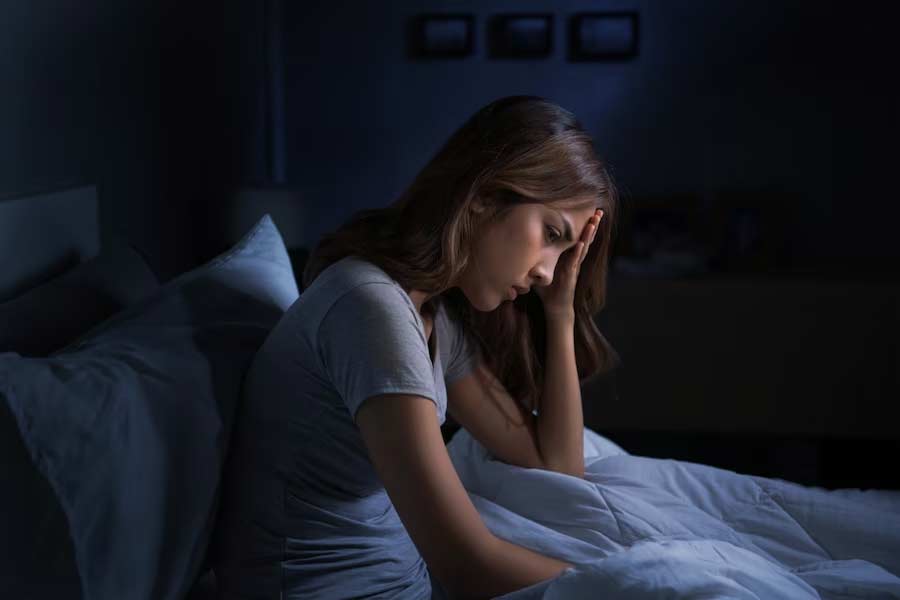
Many factors can lead to sleepless nights, including chronic pain.
Chronic pain is characterised by persistent discomfort or pain lasting for an extended period, typically beyond three to six months. According to a study published in the Indian Journal of Palliative Care, up to 30% of the world's population suffers from pain, which in turn contributes to insomnia, a common sleep disorder that makes it difficult to fall or stay asleep.
Table of Content:-
This condition is called painsomnia, or insomnia, caused by pain.
Speaking with the OnlyMyHealth team, Dr Vichar Nigam, Consultant-Internal Medicine, Manipal Hospital, Kharadi, Pune, explains the common causes and ways to manage the same.
Also Read: Warning Signs Of Diabetes That Occur In The Night
What Is Painsomnia?

The term painsomnia is a combination of two words: pain and insomnia. While pain is a discomforting sensation caused by physical ailments, insomnia is characterised by the inability to fall or stay asleep.
Therefore, painsomnia describes the state of people struggling with a lack of sleep due to chronic pain.
As per a study published in the Journal of Sleep Research, up to 80% of people with chronic pain suffer from insomnia.
Why Some People Feel More Pain At Night
Dr Nigam says, “There are many etiologies or reasons for the origin of pain, including musculoskeletal pain, neuropathic pain, and visceral pain.”
Musculoskeletal pain refers to acute or chronic pain that affects bones, muscles, ligaments, tendons, and even nerves. The most prevalent types of musculoskeletal pain include chronic low back pain, neck pain, and the pain associated with osteoarthritis and rheumatoid arthritis.
A study published in the Journal of Clinical Medicine found that up to 70% of patients with rheumatoid arthritis experience insomnia, including difficulty falling asleep, difficulty maintaining sleep, or suffering from daytime sleepiness.
Neuropathic pain, also known as nerve pain, occurs when health conditions affect the nerves. These include Multiple Sclerosis (MS), fibromyalgia, or carpal tunnel syndrome.
Lastly, visceral pain occurs when our internal organs are damaged or injured, leading to inflammation. This includes bowel obstruction, acute pancreatitis, endometriosis, and more.

According to the doctor, etiologies like musculoskeletal pain increase with activity, while neuropathic pain occurs more at rest; hence, these are felt more at night.
Nighttime pain or body aches can be attributed to various factors, including:
- A drop in cortisol production around midnight
- Staying in one sleep position throughout the night, which can lead to joint stiffness
- Conditions such as multiple sclerosis and arthritis, especially rheumatoid arthritis, can manifest symptoms like fatigue, tingling, and joint pain at night.
Also Read: What Does An Ideal Breakfast Look Like For Diabetics: Foods To Eat And Avoid
The Risk Of Chronic Insomnia

According to Dr Nigam, any pain has the capacity to increase one’s blood pressure and overall sympathetic activity, making a person restless and increasing their risk of chronic insomnia.
“Until the cause gets relieved, sleeplessness continues and results in all effects of poor sleep, like chronic insomnia, anxiety, hypertension, metabolic disorders like diabetes, dyslipidemia, and a fatty liver,” he says.
The US National Heart, Lung, and Blood Institute describes chronic insomnia as sleep issues that occur three or more nights a week, last more than three months, and cannot be fully explained by another health problem.
How To Approach The Condition
Dr Nigam recommends keeping things simple.
“Treat the cause, get appropriate consultations, investigate, and manage your conditions,” he says, adding, “The best part is your doctors can help you with medicines for neuropathic pains that have positive effects on sleep to manage it temporarily.”
As per the Sleep Foundation, insomnia management and treatment may involve improving sleep hygiene, cognitive-behavioural therapy, and medications to aid sleep.
Also watch this video
How we keep this article up to date:
We work with experts and keep a close eye on the latest in health and wellness. Whenever there is a new research or helpful information, we update our articles with accurate and useful advice.
Current Version